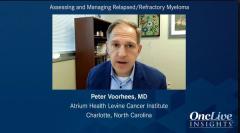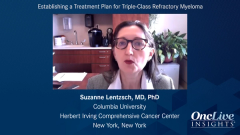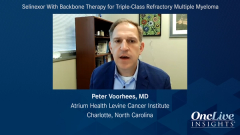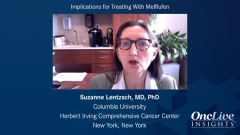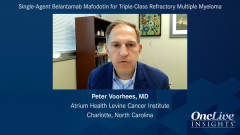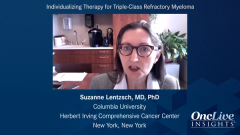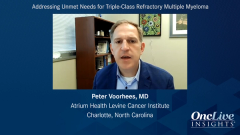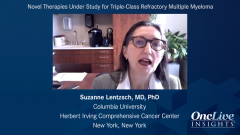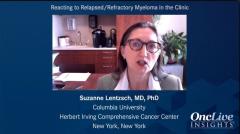
Novel Therapies Under Study for Triple-Class Refractory Multiple Myeloma
Novel therapies in clinical development to improve outcomes for patients with triple-class refractory multiple myeloma.
Episodes in this series

Suzanne Lentzsch, MD, PhD: The promising advances in triple-class multiple myeloma are in immunotherapy, with a focus on the BiTEs [bispecific T-cell engagers] and CAR [chimeric antigen receptor] T cells. We talked a lot about BCMA as a target. Right now, the BCMA CAR T cells are approved for multiple myeloma. There are many bispecific T-cell engagers and BCMA antibodies in clinical trials.
BiTEs bind BCMA on the surface of multiple myeloma cells. It also binds a T cell, and it brings the myeloma cell and the T cell into proximity so that the T-cell can directly kill the multiple myeloma cell. The T cells are also activated by the binding. It’s mimicking a natural immune response by activating the T cell and bringing the T cells together with a multiple myeloma cell in order to induce the T cell of the patient killing a tumor cell.
I’m also excited about the option to use other targets, and not only BCMA for CAR T cells and BiTEs. If you look into the future—the clinical trials are already ongoing—they use 2 targets to develop a CAR T cell, not only a BCMA but also a second antigen that you’re targeting with your CAR T cells. Those are very promising developments. The future in multiple myeloma, especially in triple-class refractory disease, is probably in immunotherapy, CAR T cells, and for older patients, BiTEs. There are also ongoing studies with allogenic CAR T cells, or with allogenic NK [natural killer] cells. Those trials are in the early stages, but also very promising in order to avoid the additional generation of stem cells and use off-the-shelf allogenic CAR T cells. We will see what those trials will bring. The immunotherapy, and especially the cellular therapy, is probably most exciting about the future in relapsed/refractory multiple myeloma.
Peter Voorhees, MD: There are a lot of exciting things occurring for patients with triple-class refractory multiple myeloma. There was the KarMMa-2 trial, which is the phase 2 study looking at the BCMA-targeted CAR T-cell product, idecabtagene vicleucel, in patients with relapsed/refractory multiple myeloma. In that study, in the overwhelming majority of patients who had triple-class refractory disease, the overall response rate was a remarkable 73%. That’s clearly much higher than the response rates we saw with selinexor and dexamethasone, melphalan flufenamide and dexamethasone, as well as belantamab mafodotin in a similar patient population. The median duration of response was 10.7 months. The majority of patients relapse in this particular situation, but these are much better results than we’ve seen with other treatment strategies out there. Although that median duration of response is actually very similar to the other FDA-approved BCMA-targeted agent, belantamab mafodotin. So even though the overall response rate with belantamab mafodotin may be lower than it is with idecabtagene vicleucel, the median duration of response of both of the therapeutics is very similar.
A lot of us are excited about additional CAR T-cell therapies that are in development. For example, Janssen’s ciltacabtagene autoleucel product looks very promising. There are a large number of CAR T-cell products in development, targeting not just BCMA but other novel plasma cell–specific markers, such as GPRC5D. A lot of us are very interested in the bispecific antibodies, like those that are targeted against BCMA such a teclistamab, which is made by Janssen, but also other bispecific antibodies out there, including those targeted against the plasma cell–specific marker GPRC5D.
Transcript Edited for Clarity


